
Zviad Konstantines dze Gamsakhurdia was a Georgian politician, human rights activist, dissident, professor of English language studies and American literature at Tbilisi State University, and writer who became the first democratically-elected President of Georgia in May 1991.

Konstantine Gamsakhurdia was a Georgian writer and public figure. Educated and first published in Germany, he married Western European influences to purely Georgian thematic to produce his best works, such as The Right Hand of the Grand Master and David the Builder. Hostile to the Soviet rule, he was, nevertheless, one of the few leading Georgian writers to have survived the Stalin-era repressions, despite exile to a White Sea island and several arrests. His works are noted for their character portrayals of great psychological insight. Another major feature of Gamsakhurdia's writings is a new subtlety he infused into Georgian diction, imitating an archaic language to create a sense of classicism.

JabaIoseliani was a Georgian politician, member of Parliament of Georgia, writer, thief-in-law and leader of the paramilitary organisation Mkhedrioni.
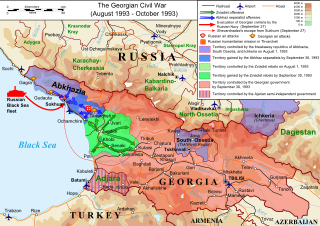
The Georgian Civil War lasted from 1991 to 1993 in the South Caucasian country of Georgia. It consisted of inter-ethnic and international conflicts in the regions of South Ossetia and Abkhazia, as well as the violent military coup d'état against the first democratically-elected President of Georgia, Zviad Gamsakhurdia, and his subsequent uprising in an attempt to regain power.

The April 9 tragedy refers to the events in Tbilisi, Georgian Soviet Socialist Republic, on April 9, 1989, when an anti-Soviet, pro-independence demonstration was crushed by the Soviet Army, resulting in 21 deaths and hundreds of injuries. April 9 is now remembered as the Day of National Unity, an annual public holiday.
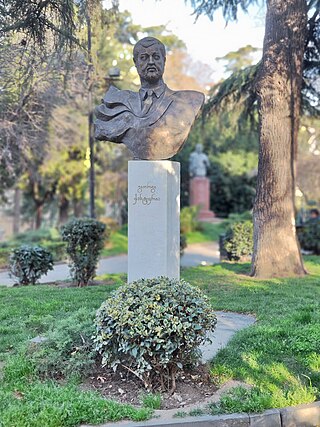
Giorgi Chanturia was a Georgian politician and the National Democratic Party leader who was murdered in Tbilisi, Georgia in December 1994.
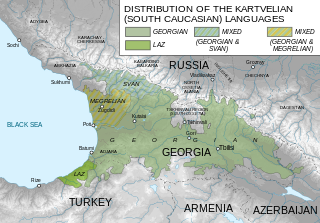
The Mingrelians are an indigenous Kartvelian-speaking ethnic subgroup of Georgians that mostly live in the Samegrelo-Zemo Svaneti region of Georgia. They also live in considerable numbers in Abkhazia and Tbilisi. In the pre-1930 Soviet census, the Mingrelians were afforded their own ethnic group category, alongside many other ethnic subgroups of Georgians.
Soviet dissidents were people who disagreed with certain features of Soviet ideology or with its entirety and who were willing to speak out against them. The term dissident was used in the Soviet Union (USSR) in the period from the mid-1960s until the Fall of Communism. It was used to refer to small groups of marginalized intellectuals whose challenges, from modest to radical to the Soviet regime, met protection and encouragement from correspondents, and typically criminal prosecution or other forms of silencing by the authorities. Following the etymology of the term, a dissident is considered to "sit apart" from the regime. As dissenters began self-identifying as dissidents, the term came to refer to an individual whose non-conformism was perceived to be for the good of a society. The most influential subset of the dissidents is known as the Soviet human rights movement.

The 1991–1992 South Ossetia War was fought between Georgian government forces and ethnic Georgian militias on one side and the forces of South Ossetian separatists and Russia on the other. The war ended with a Dagomys Agreement, signed on 24 June 1992, which established a joint peacekeeping force and left South Ossetia divided between the rival authorities.
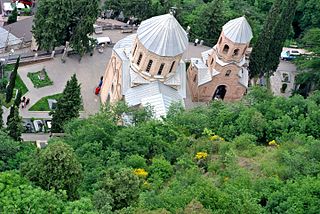
The Mtatsminda Pantheon of Writers and Public Figures is a necropolis in Tbilisi, Georgia, where some of the most prominent writers, artists, scholars, and national heroes of Georgia are buried. It is located in the churchyard around St David's Church "Mamadaviti" on the slope of Mount Mtatsminda and was officially established in 1929. Atop the mountain is Mtatsminda Park, an amusement park owned by the municipality of Tbilisi.
On 14 April 1978, demonstrations in Tbilisi, capital of the Georgian SSR, took place in response to an attempt by the Soviet government to change the constitutional status of languages in Georgia. After a new Soviet Constitution was adopted in October 1977, the Supreme Soviet of the Georgian SSR considered a draft constitution in which, in contrast to the Constitution of 1936, Georgian was no longer declared to be the sole state language. A series of indoor and outdoor actions of protest ensued and implied with near-certainty there would be a clash between several thousands of demonstrators and the Soviet government, but Georgian Communist Party chief Eduard Shevardnadze negotiated with the central authorities in Moscow and managed to obtain permission to retain the previous status of the Georgian language.
The Sukhumi riot was a riot in Sukhumi, Abkhaz Autonomous Soviet Socialist Republic, Georgian Soviet Socialist Republic, Soviet Union, in July 1989, triggered by an increasing inter-ethnic tensions between the Abkhaz and Georgian communities and followed by several days of street fighting and civil unrest in Sukhumi and throughout Abkhazia.

An independence referendum was held in the Republic of Georgia on 31 March 1991. It was approved by 99.5% of voters.

Tengiz Gudava was a Georgian author and human rights activist who was expelled from the Soviet Union in 1987 and worked for Radio Free Europe/Radio Liberty for 17 years. He died in Prague in 2009 under ill-defined circumstances.
Murman Omanidze was a Georgian politician and the Minister of Foreign Affairs of Georgia in 1991.
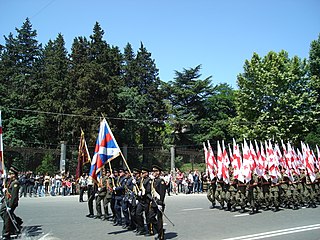
Independence Day is an annual public holiday in Georgia observed on 26 May. It commemorates the 26 May 1918 adoption of the Act of Independence, which established the Democratic Republic of Georgia in the aftermath of the Russian Revolution of 1917. It is the national day of Georgia. Independence Day is associated with military parades, fireworks, concerts, fairs, and political speeches and ceremonies, in addition to various other public and private events celebrating the history and culture of Georgia.

The Order of the National Hero is the highest honor awarded by the government of Georgia together with the title of National Hero. It was established in 2004.
Ilia Chavchavadze Society is a political organisation from Georgia. The group dates back to the days of the Soviet Union, where it was an important factor in the growth of Georgian nationalism.
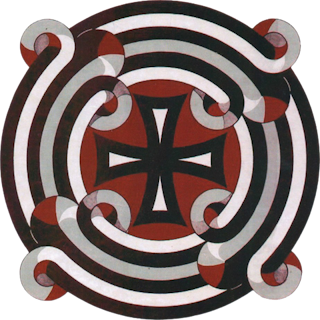
Round Table—Free Georgia was an alliance of Georgian political parties led by Zviad Gamsakhurdia. It played a decisive role in the restoration of independence of Georgia and was a governing coalition in 1990-1992.

The 1991–1992 Georgian coup d'état, also known as the Tbilisi War, or the Putsch of 1991–1992, was an internal military conflict that took place in the newly independent Republic of Georgia following the fall of the Soviet Union, from 22 December 1991 to 6 January 1992. The coup, which triggered the Georgian Civil War, pitted factions of the National Guard loyal to President Zviad Gamsakhurdia against several paramilitary organizations unified at the end of 1991 under the leadership of warlords Tengiz Kitovani, Jaba Ioseliani and Tengiz Sigua.
















